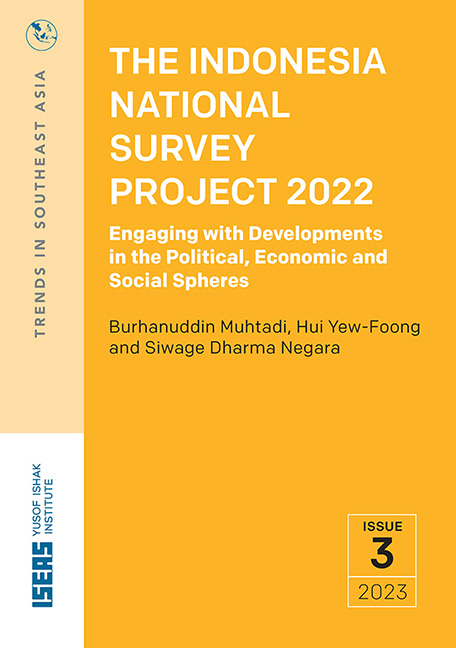 The Indonesia National Survey Project 2022
The Indonesia National Survey Project 2022 Published online by Cambridge University Press: 09 January 2024
ISEAS – Yusof Ishak Institute has commissioned a second nationwide survey in Indonesia as a follow-up to the first similar project in 2017 called the Indonesia National Survey Project (INSP). Its broad aim is to enhance understanding of political, economic, and social developments in Indonesia. Its key findings are as follows:
• The approval rating of President Joko Widodo hovers around 71.8 per cent, at least before the September 2022 announcement on the fuel subsidy cut. His major infrastructure push as his flagship development programme still garners the most positive assessment. However, poverty, unemployment and cost of living remain key flashpoints that the government should be concerned with.
• While respondents are generally aware of the plan to relocate the national capital and are more likely to agree rather than disagree with it, most have reservations about its urgency and the financial burden that such an undertaking implies.
• Muslim countries such as Saudi Arabia and Turkey are the most admired by Indonesians, followed by Singapore. In view of the ongoing armed conflict in Europe, it is notable that Russia is more admired than the US and EU.
• Where the rise of China is concerned, respondents who perceive a negative impact exceed those who perceive a positive one, which is a reversal of the trend found in the 2017 survey. At the same time, negative opinions towards China’s Belt and Road Initiative is also more strongly evident than positive opinion.
• While Indonesian Muslims are generally devout practising Muslims, the majority do not harbour aspirations to make Indonesia an Islamic state, preferring instead the cultural inclusiveness currently in place.
• Reservations about the political role of Chinese Indonesians continue to persist, and a majority do not support members of this community taking up key political positions.
• Respondents are largely aware of climate change, environment and energy transition issues, and support government policies addressing them. However, the major challenge is seen to be in the promotion of lifestyle changes that will reduce damage to the environment.
To save this book to your Kindle, first ensure [email protected] is added to your Approved Personal Document E-mail List under your Personal Document Settings on the Manage Your Content and Devices page of your Amazon account. Then enter the ‘name’ part of your Kindle email address below. Find out more about saving to your Kindle.
Note you can select to save to either the @free.kindle.com or @kindle.com variations. ‘@free.kindle.com’ emails are free but can only be saved to your device when it is connected to wi-fi. ‘@kindle.com’ emails can be delivered even when you are not connected to wi-fi, but note that service fees apply.
Find out more about the Kindle Personal Document Service.
To save content items to your account, please confirm that you agree to abide by our usage policies. If this is the first time you use this feature, you will be asked to authorise Cambridge Core to connect with your account. Find out more about saving content to Dropbox.
To save content items to your account, please confirm that you agree to abide by our usage policies. If this is the first time you use this feature, you will be asked to authorise Cambridge Core to connect with your account. Find out more about saving content to Google Drive.